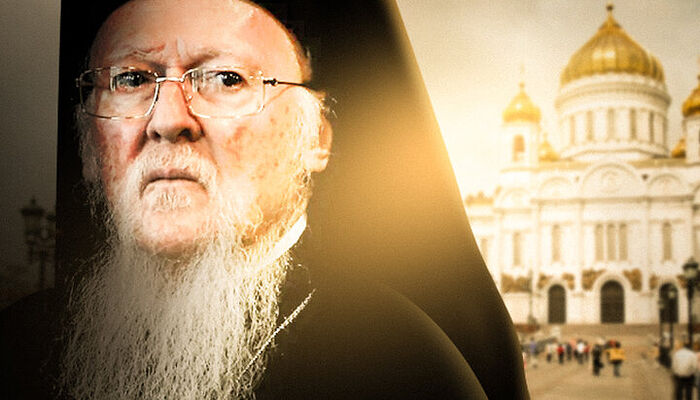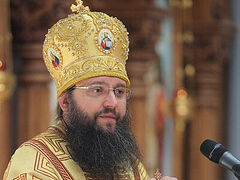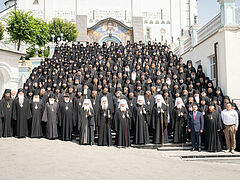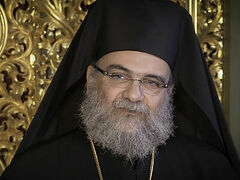Patriarch Bartholomew said that he “couldn’t care less” that the Russian Orthodox Church doesn’t commemorate him. Why did one of Church’s most respected hierarchs express himself this way, and what did he mean?
Speaking before respected representatives of the Greek diaspora in the U.S., Patriarch Bartholomew said that he “couldn’t care less” that his name isn’t included in the diptychs of the Russian Orthodox Church.
The phrase used by the Patriarch of the Great Church of Constantinople is rather vulgar. According to Russian-speaking Greeks, who are equally proficient in both languages, Patriarch Bartholomew’s expression “σκασίλα μου” is rather boorish, and the translation of “I could care less” is too soft. The theatrical pause of the head of the Phanar at this point and the laughter of the Greek audience are also quite telling.
The impression is that the Phanar leader stopped literally a step away from obscenity, for now. It’s quite possible that there’ll be more next time. Why do we think so? Because we regrettably must state that, once one of the most authoritative Patriarchs of the world, this hierarch of the Church of Christ is gradually turning into a man who’s increasingly moving away from the Gospel and the teachings of Christ. This is evidenced not only by his devil-may-care answer to the question about the unity of the Church, but also by many other examples, which we will speak about below. Why’s this happening and what caused such blatant spiritual degradation?
Stubbornness of will and admitting mistakes
One of the Fathers of the Church said that “heresy isn’t a delusion of the mind, but stubbornness of will.” Indeed, many heretics were highly educated people and couldn’t but understand that their teachings were at variance with the teachings of Christ and the Church, although they still clung to their heresies. Why? Because of stubbornness of will—that is, because of pride.
In other words, admitting our mistakes requires the renunciation of pride, and this has always been a problematic solution for heretics, as Church history shows us. After all, they believed they were better than others, smarter, more educated, and therefore no one could dare teach them or correct them. As a result, Arius, Nestorius, and Macedonius dishonored their names and went down in Church history as heresiarchs. It seems we’re seeing the same problem with Patriarch Bartholomew.
By granting the tomos to the OCU, he consciously committed a canonical crime. The head of the Phanar explained his actions as “necessary” and “beneficial” for the Church. That is, according to him, the “autocephaly” of the OCU was supposed to overcome the schism in Ukraine, to unite the “three branches of Ukrainian Orthodoxy” and join millions of Ukrainians to the Church of Christ (we won’t go into the personal interests of the Patriarchate of Constantinople). But, none of this happened. And it’s impossible not to see this.
There isn’t even an elementary, real union of the Ukrainian schismatics among themselves.
As we know, one of the main principles of the existence of the Church as an institution is the principle of “one city-one bishop,” formulated at the First Ecumenical Council. Before the formation of the OCU, every major Ukrainian city had a “bishop” from the “Kiev Patriarchate” and a “bishop” from the “Ukrainian Autocephalous Orthodox Church.” According to the logic of canon law, with the formation of a new “united Church,” the dioceses of the former structures on the same territory should have united into one.[1] Thus, one of the “ruling bishops” should have yielded and submitted to the other. But nothing of the sort happened. In every provincial center, there still exist two dioceses and two “bishops.” And in Vinnitsa, where the OCU structure has three whole dioceses after Metropolitan Simeon (Shostatsky), the former ruling hierarch of the Vinnitsa Diocese of the UOC, went into schism: Vinnitsa-Bar, Vinnitsa-Bratslav, and Vinnitsa-Tulchin. Despite the difference in names, all three structures have their cathedrals in Vinnitsa and the “ruling hierarchs” live there too.
In other words, the mechanical “autocephaly” of the OCU didn’t fulfill the mission the Phanar had for it. Moreover, it split the Orthodox world, because some Churches and hierarchs recognize its legitimacy, while others don’t. Does Patriarch Bartholomew see this? Yes. Does he understand what’s happening? Of course. Then why doesn’t he annul his decision about the OCU’s tomos, as, for example, he abolished the autonomy of the Archdiocese of Western Parishes? The answer is given above: “Not a delusion of the mind, but stubbornness of will.” That is, it’s pride that prevents the Phanar leader from making the only correct decision in this situation. What gives us the right to say such a thing? Comparing the actions of Patriarch Bartholomew with what the Holy Fathers say about pride.
The first sign of pride: self-exaltation
Pride is a moral sin and passion that, like any passion, has a progressive character and necessarily affects all aspects of a man’s spiritual life. St. John Chrysostom writes that “pride is the beginning of sin,” because “every sin begins from it and finds its support in it.”
This is how Abba John Cassian speaks of pride:
This passion, although it’s the latest in our conflict with our faults and stands last on the list, yet in beginning and in the order of time is the first: an evil beast that is most savage and more dreadful than all the former ones, chiefly trying those who are perfect, and devouring with its dreadful bite those who have almost attained the consummation of virtue… How great is the evil of pride, that it rightly has no angel, nor other virtues opposed to it, but God Himself as its adversary! (Institutes, On Pride 1, 7).
St. Anthony the Great echoes him: “All sins are abominable before God, but most abominable of all is the pride of the heart.”
But how can you recognize a proud man? What signs indicate that a man is subject to this passion? Let us listen to St. Basil the Great: “The beginning of pride is usually contempt. He who disdains and considers others as nothing—considering some poor, others as people of lowly origin, others as ignoramuses—comes as a result of such contempt to a point that he considers himself alone to be wise, prudent, rich, noble, and strong.”
Now let’s compare the words of the great Holy Hierarch with several statements from Patriarch Bartholomew. For example, commenting on the Russian Church’s disagreement with the recognition of the OCU, the head of the Phanar said that it’s “a slanderous campaign against the historical responsibilities of the Patriarchate of Constantinople, which brought them Christianity and made them civilized people.”
Precisely that self-exaltation that St. Basil pointed to is evident in these words. This is verified not only by Patriarch Bartholomew, but also by his closest associates. For example, Metropolitan Apostolos (Daniilidis) of Derkoi, one of the oldest bishops of the Patriarchate of Constantinople, literally said:
With disgust, I read in the media the anti-church and anti-Greek statements of representatives of the Russian presence in Ukraine and with holy indignation, I answer: Close your mouths and take your hands off the successor of those who made you Christians! You owe everything you are to what you so disparagingly call Istanbul! For us, this is the only city that has been standing here for centuries now and gives only good to all of you who are celebrating the 1,033rd anniversary of your adoption of Christianity, without mentioning anywhere who baptized you and gave you what you boast of now. We gave you light, and you return it to us shrouded in darkness! We gave you grace, you give us ingratitude! We brought you culture, you insult us![2]
We could cite other statements of both Patriarch Bartholomew and other representatives of the Phanar, who constantly appeal to its role in the history of the Russian and other Churches. The Phanariots think the very fact of having received the faith of Christ from the hands of the Greeks is sufficient reason to occupy a special position in the Church. But the most important thing in the Church isn’t ethnic ancestry, being heirs of this or that nation or this or that civilization, but rather to be an heir of the saints, to be of Christ’s ancestry. In the end, didn’t the Jews tell Christ that we are Abraham’s seed? And do you remember how Christ answered them?
The second sign of pride: the desire for honor
St. Basil the Great points to another sign of the proud man: “How is the proud man known? He’s known in that he seeks preferential treatment.”
That is, besides exaltation, the second sign of pride is the desire for honor and preference. Let’s read the words of Patriarch Bartholomew: “We have a responsibility to lead the Local Autocephalous Churches as the elder brother of one family.” Or: “Those who doubt the rights and responsibilities of the Ecumenical Patriarchate, in fact, cast doubt upon their very existence and identity, the very structure of Orthodoxy.”
In another place, the Phanar head speaks about the place he believes he should occupy in the Church: “I would like to ask: Doesn’t every diocese have its first? Isn’t there a first in every Church? Then why isn’t there one among the Local Churches? Given that from the smallest structure, the parish, to the Local Church as a whole they have their first, how is it possible that the Local Churches don’t have their first?”
And here are the words of Metropolitan Amphilochius of Andrianople: “There is a view that the Church is headed by Christ. But in fact, the Church is headed by the Ecumenical Patriarch.”
But in the Church, the first, that is, its Head, always was, is, and will be the Lord Jesus Christ. And the Phanar’s disagreement with this truism only points to the disease that has struck this once Great Church.
The third sign of pride: resentment
To exaltation and the desire for honors, St. John Chrysostom adds a third sign of pride: resentment: “The proud man is disposed to avenge offenses. The proud man is incapable of indifferently bearing insults from either those above him or those below him. And whoever doesn’t bear insults calmly is unable to bear misfortunes.”
And again, in an interview with the Greek outlet Politis, Patriarch Bartholomew literally said the following: “We were definitely upset by the initiative to hold the ‘fraternal meeting’ in Amman.” But why should an Orthodox Patriarch be upset by a meeting of the primates of the Local Churches? Because they don’t agree with his decision to recognize the OCU; because he wasn’t the one that gathered them; because some of them declined to participate in the Crete council that was organized by the Phanar.
In general, Patriarch Bartholomew has hinted more than once that the decision to recognize the OCU was prompted by the Russian Church’s refusal to participate in the Crete council. Here’s but one such statement: “They’re asking for a council now! They should have recognized the pan-Orthodox Crete council, and they should have gone to it. But they didn’t.”
Here we must recall St. John Cassian’s discussion about pride:
Pride is distinguished by the following signs: Its loudness in conversation, in silence—vexation, in gaiety—loud overflowing laughter, in sad instances—unreasonable grief, in responding—obstinacy, in speech—frivolity, that is, words pronounced recklessly, without any participation of the heart. It has no patience, it’s foreign to love, it boldly insults but can’t endure insults. It’s not inclined towards obedience if something doesn’t correspond with its own desire and will. It’s unyielding about accepting admonition; it’s weak about renouncing its own will; it’s stubborn about subordinating to others; it always tries to insist on its own opinion, and it absolutely doesn’t want to yield to any other; and thus, having become incapable of accepting salvific advice, it trusts its own view in everything more than the judgment of elders or spiritual fathers.
Pride as a spiritual disease
The Orthodox are already getting used to some new shocking statement from Patriarch Bartholomew every month or two. It’s probably not worth quoting all these words when Patriarch Bartholomew boldly insulted, was inflexible about accepting admonitions, tried to insist on his own opinion, and trusted himself more than the judgment of elders or spiritual fathers. All of these statements have been widely discussed in the Orthodox sphere.
It’s obvious that the spiritual state of the primate of the Church of Constantinople is quite similar to that described by St. John Cassian. And how could it be otherwise? After all, first deciding to grant a tomos to the unrepentant Ukrainian schismatics, and then remaining in communion with them, the Patriarch simply cannot avoid infection with the spiritual disease that these people suffer from—pride. It’s this passion that prevents a man from saying those two simple word: “Forgive me.” It prevents him from admitting his mistakes; prevents him from traveling the path of correction.
And if this is true when we’re talking about an ordinary Christian, then in regards to Patriarch Bartholomew, the problem of spiritual dependence on pride only increases many times over. St. John Cassian wrote that “pride compares the high walls of holiness with the land of vices and leaves no freedom to the conquered soul. And the richer the soul it takes into captivity, the more itsubjects it to the heavy yoke of slavery; and having cruelly plundered all its assets of virtues, it strips it completely naked.”
We dare to assert: Patriarch Bartholomew is a man in captivity to passion, and, in the words of St. Basil the Great, he “cannot be healed from this passion if he doesn’t lay aside all thoughts about his preferredness.” All the more so because he’s a monk, and it’s always good for a monk and a Christian to fight against exaltation and pride.
Because, as St. John Chrysostom says: “there is no evil equal to pride,” because “it turns a man into a demon—an impudent, blasphemous oath-breaker.” Let us add: “and into someone who ‘couldn’t care less’ about the unity of the Church of Christ.”





